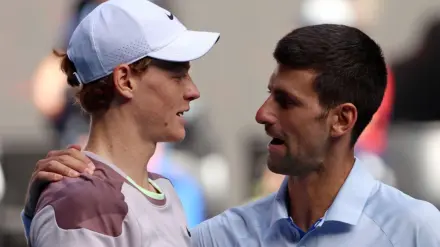It remains to be seen whether Jannik Sinner can follow up his giant-killing act with another win in today’s Australian Open final, but the tall Italian has achieved what no one – including Roger Federer, Rafael Nadal, Andy Murray, and Stan Wawrinka – have managed at Melbourne Park. It now gives him a chance to write his name in the history books.
In its one-against-one nature, tennis comes closest to combat sports such as boxing and wrestling. One can prepare and be coached as much as they want, but when they cross the line, players are on their own. According to Mike Tyson, “Everyone has a plan until they get punched in the mouth.”
In that sense, tennis is different from another individual sport, golf, where players are not in one-on-one contests unless it’s a match-play format. In tennis, one cannot win in the clubhouse, which is often the case in golf if a player finishes his round with a big enough lead and waits and watches if any of his pursuers catch up.
Sinner, too, had to see it through despite rushing through the first two sets against the off-colour Novak Djokovic in the semifinal. He knew that the Serb, a 10-time champion at the Rod Laver Arena who was unbeaten on that court since 2018, will make it tough at some point, and was proved right when the legend got into lockdown mode at the tail-end of the third set, refused to make errors, saved a match point in the tie-break and extended the match.
The aura of Djokovic, Nadal, and Federer has been such over the years that many players would buckle at the start of such a comeback. They start to play the man and not the ball coming at them.
But Sinner didn’t fall into the trap. He would have gone into the match prepared that it would take time, and after three sets, would have thought that it was better to be two sets to one up than the other way round. He reset himself, started the fourth set well, and kept the pressure on Djokovic, who buckled.
But getting the vital break and making it count are not the same. Sinner maintained composure at a stage when many would have gotten over-excited at seeing the finish line. He stayed true to the strategy that had got him to a winning position. He played as if he had a match to win, not a lead to defend.
There have been many false dawns about the Gen-Next in men’s tennis. The unprecedented dominance of the ‘Big Three’ meant the likes of Jo-Wilfried Tsonga, Tomas Berdych, and David Ferrer only shone sporadically and never on the final Sunday of a Grand Slam. The almost unreal longevity that the three legends displayed meant that successive generations had to contend with them throughout their own careers. But now, Federer is retired, and 2024 will be Nadal’s final year on tour. Djokovic will turn 37 in May, and though it will be premature to write him off after a fortnight of below-par displays, the likes of Sinner, Alexander Zverev, Daniil Medvedev, and Carlos Alcaraz have to own the stage at some point in time.
A metronome
Father Time catches up with everyone. But Djokovic isn’t going anywhere for the time being. He has probably been the toughest player to beat in the modern era. Federer was capable of magical things with a tennis racquet in hand, but there was always a feeling that he was living on the edge. While it made for exhilarating viewing, if his game was slightly off, errors could flow. Nadal was grit and determination personified, but if a big server with heavy groundstrokes got him on a fast court, there was always a chance.
But Djokovic’s consistency is so otherworldly, and his base game of such high quality that he very often doesn’t have to be at his best to pull out matches. He is also a master at staying in the contest being clearly second-best before pouncing when his opponent’s game tapers off. Opponents often feel as if they are hitting against a wall, and every shot comes back with interest. That has been the secret of his record 24 Grand Slam titles, a mark that seems unreachable in the foreseeable future.
A solitary loss, even at the Grand Slam where he has enjoyed the most success, doesn’t necessarily signal a decline. It needed a supreme effort – physical, mental, and tactical – from one of the most talented players of this generation to get the job done. But it could provide belief to others that it could be done on the big stage. The way the ATP rankings work, Djokovic is guaranteed to stay on top for at least a few months as he has very few points to defend in the coming tournaments, while his closest challengers need to win a lot of matches to protect their positions.
The Serb is expected to be a big factor in the coming majors, regardless of the surface they are played on. He will be the one to beat once again.
As far as Sinner is concerned, he should know that the level he displayed against Djokovic should be good enough to land him his maiden Grand Slam crown. He faces Medvedev, who already has one of these – that too beating Djokovic in the US Open final, denying him a calendar Grand Slam. But the Russian has spent a lot more time on the court in this tournament, having to come back from two sets down in the semifinal against Alexander Zverev.
He has Grand Slam nous to win over five sets on the big stage. But if Sinner falls short today, it would feel like a big opportunity missed.
